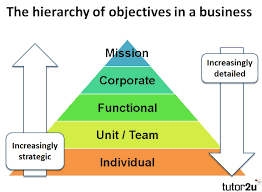Business Objectives
What are Business Objectives?
Specific intended outcomes of business strategy and activity
Targets which a business sets to help it achieve its aims
Main functions?
State what needs to be achieved
A focus for all activity
Targets for individual and group achievement
A way to measure performance
Typical corporate objectives:
Sales revenue
Profit
Return on investment
Growth
Market share
Cash flow
Value of the business
Corporate image and reputation
Smart business objectives:
S: Specific
The objective should state exactly what is to be achieved
M: Measurable
An objective should be capable of measurement- so that it is possible to determine whether (or how far) it has been achieved
A: Achievable
The objective should be realistic given the circumstances in which it is set and the resources available to the business
R: Relevant
Objectives should be relevant to the people responsible for achieving them
T: Time-Bound
Objectives should be set with a time frame in mind. These deadlines also need to be realistic

The hierarchy of objectives in business:
Mission
Corporate
Functional
Unit/Team
Individual
Examples of functional Objectives:
Increase market share: Successfully launch five new products in existing markets over the next two years (Marketing)
Reduce unit costs: Increase factory productivity by 10% within 2 years (Operations)
Increase cash flow: Reduce the average time taken by customers to pay invoices from 70 to 60 days (Finance)
Improve customer satisfaction: Achieve a 95% level of high customer service (HR)